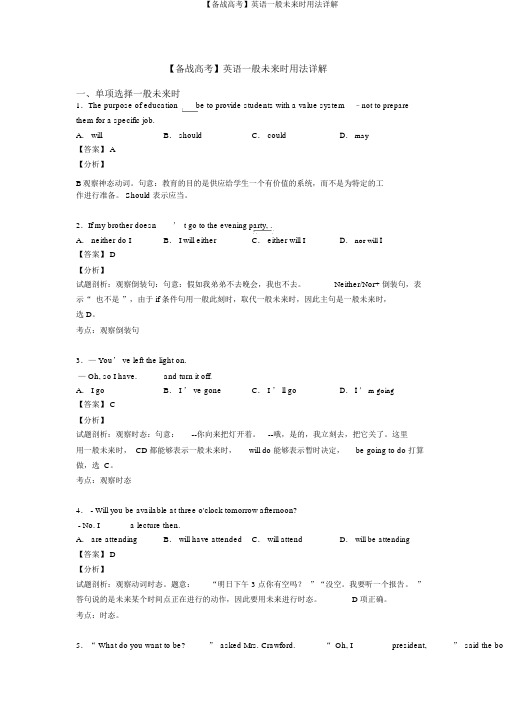高考一般将来时详解+例句
- 格式:doc
- 大小:67.50 KB
- 文档页数:9

一般将来时——高考英语重点时态语态满分攻略满分清单:一、构成1.is /am /are +现在分词2.will/shall +动词原形3.is/am/are going to +动词原形4.is/am/are about to +动词原形5.is/am/are to +动词原形二、用法1.will/shall +动词原形(1)表示现在看来以后要发生的动作或存在的状态You will find various choices available.你会发现有各种各样的选择。
(2)表示说话人临时做出的决定—Do you know Mr. Smith has come to our town?—No. I will go and visit him right now.——你知道史密斯先生来我们镇上了吗?——我不知道,我现在就去拜访他2.be going to +动词原形(1)表示打算、计划、决定要做的事或肯定要发生的事He is going to deliver a speech on first aid.他将就急救问题发表演讲。
(2)表示说话人根据已有的事实或迹象,推测某事即将发生Look at the dark clouds. It is going to rain看这些乌云,要下雨了。
3.be about to +动词原形表示打算或根据安排即将发生的动作。
它不与表示具体时间的状语连用,但可以与when 引导的时间状语从句连用。
Ladies and gentlemen, you are about to hear a most incredible tale.女士们,先生们,你们马上就要听到一个令人非常难以置信的故事。
4.be to +动词原形(1)表示按计划或安排要做的事情The opening ceremony is to take place next Sunday.开幕式将于下周日举行。
(2)表示按职责、义务将要发生的动作You are to report it to the police.你应该报警。

一般将来时的12种表现形式(附词典例句)以下例句均出自词典(有标注)1.will /shall do 其中shall多用于第1人称;will可用于第2/3/1人称2.be going to do 表示决定、打算、计划做某事3.be doing4.be to do 表示计划、安排、约定、意图、将要,应该接近于should, ought to等5.be about to do6.be on the point of doing7.be due to do sth预定/预期/预计做某事8.祈使句9.倒装句——全倒装(只用一般过去时、一般现在时)10.情态动词 + do11.主将从现12.一般现在时的形式——表达将来的含义以下具体分述。
一般将来时的表现形式:以下例句均出自词典或高考真题(有标注)1.will /shall do 其中shall多用于第1人称;will可用于第2/3/1人称表示将要发生的动作或存在的状态表示倾向、习惯、必然发生的事shall用于第2/3人称,表示意志/决心/规定/必然性A meeting will be held next Tuesday at 3p.m.下星期二下午3点将召开一个会议(朗文5p2895)What time will she arrive? 她什么时候到达?(朗文5p2895)Trish will keep asking silly questions.特里斯老是不停地问一些愚蠢的问题。
(表示习惯,同上)Oil will float on water. 油总是浮于水面。
(表示总是、必然,朗文5p2895)Accidents will happen. 意外总是难免的。
(表示总是、惯于,朗文5p2895)We shall be away next week. 我们下周要出去。
(朗文5p2307)I’ve never liked her and I never shall. 我从来都不喜欢她,以后也不会。

(完整版)高中一般将来时讲解高中一般将来时讲解(完整版)一般将来时是英语语法中的一个重要时态,用来表示将来发生的动作或状态。
在高中阶段,学生需要掌握和运用一般将来时来描述将来的计划、意图、预测等。
下面我们将详细介绍高中一般将来时的使用和构成。
使用一般将来时可以用于以下几种情况:1. 表示将来的计划或安排。
例如:I will go to the beach this weekend.(我将在这个周末去海滩。
)2. 表示将来的意图。
例如:She will study medicine in college.(她打算在大学研究医学。
)3. 表示将来的预测或推测。
例如:It will rain tomorrow.(明天会下雨。
)构成一般将来时的构成非常简单,只需将"will"(shall)加在动词的原形前即可。
例如:I will study.(我将要研究。
)He will go.(他将要去。
)注意事项在使用一般将来时时,还需要注意以下几点:2. 疑问句的构成是将"will"(shall)置于句首。
例如:Will you attend the meeting?(你会参加会议吗?)3. 一般将来时通常不能用于表示固定的时间表或时间表安排,此时应使用其他时态。
例如:The train leaves at 9 a.m.(火车在上午9点离开。
)希望以上内容能够帮助你更好地理解和运用高中一般将来时。
如果还有任何问题,请随时向我提问。

【备战高考】英语一般未来时用法详解【备战高考】英语一般未来时用法详解一、单项选择一般未来时1.The purpose of education be to provide students with a value system–not to preparethem for a specific job.A. will B. should C. could D. may【答案】 A【分析】B观察神态动词。
句意:教育的目的是供应给学生一个有价值的系统,而不是为特定的工作进行准备。
Should 表示应当。
2.If my brother doesn’ t go to the evening party, .A. neither do I B. I will either C. either will I D. nor will I【答案】 D【分析】试题剖析:观察倒装句:句意:假如我弟弟不去晚会,我也不去。
Neither/Nor+ 倒装句,表示“ 也不是”,由于 if 条件句用一般此刻时,取代一般未来时,因此主句是一般未来时,选 D。
考点:观察倒装句3.— You’ ve left the light on.— Oh, so I have. _____ and turn it off.A. I go B. I ’ ve gone C. I ’ ll go D. I ’ m going【答案】 C【分析】试题剖析:观察时态:句意:--你向来把灯开着。
--哦,是的,我立刻去,把它关了。
这里用一般未来时, CD 都能够表示一般未来时,will do 能够表示暂时决定,be going to do 打算做,选 C。
考点:观察时态4. - Will you be available at three o'clock tomorrow afternoon?- No. I ______ a lecture then.A. are attending B. will have attended C. will attend D. will be attending【答案】 D【分析】试题剖析:观察动词时态。


一般将来时例句100句一般将来时例句(一):1、There will be a bad news for you。
将有一个坏消息给你。
2、There will be a delicious supper for us 。
我们将有一顿美味的晚餐。
3、There will be a new dress for her。
她将有一条新裙子。
4、There will be a good news for you。
将有一个好消息给你。
5、There will be a show on the playground the day after tomorrow。
后天操场上将有一场表演。
6、There will be a concert tomorrow。
明天将有一场演唱会。
7、There will be a gift for me。
我将有一份礼物。
8、There will be a English class this afternoon。
今日午时有一节英语课。
9、There is going to have a English test next Monday。
下周一将有一次英语测验。
10、There will be a mobile phone tomorrow for me。
明天我将有一部手机。
11、There will be a fortable room for you tomorrow。
明天你将有一个舒适的房间。
12、There will be rain this evening。
今晚要下雨。
13、There will be television in our classroom。
我们教室将有一台电视机。
14、There will be a happy journey for her。
她将有一个愉快的旅程。
15、There will be a romantic wedding for you tomorrow。
一般将来时例句30句一、肯定句be going to结构1.I am going to visit my grandparents next week.(我下周打算去看望我的祖父母。
)2.She is going to take a dancing class tomorrow.(她明天打算去上舞蹈课。
)3.They are going to have a picnic in the park this weekend.(他们这周末打算在公园野餐。
)4.He is going to buy a new bike soon.(他不久打算买一辆新自行车。
)5.We are going to see a movie tonight.(我们今晚打算去看电影。
)will结构6.The sun will rise at 6:30 tomorrow morning.(太阳明天早上六点半将会升起。
)7.I will help you with your homework later.(我稍后会帮你做家庭作业。
)8.She will become a doctor when she grows up.(她长大后将会成为一名医生。
)9.They will travel to France next year.(他们明年将去法国旅行。
)10.T he flowers will bloom in spring.(花在春天将会开放。
)二、否定句be going to结构11.I'm not going to play football because of the rain.(因为下雨我不打算去踢足球了。
)12.S he isn't going to go shopping this afternoon.(她今天下午不打算去购物。
)13.T hey aren't going to have a party tonight.(他们今晚不打算举办派对。
10个一般将来时句子篇一:一般将来时的句子一般将来时的句子一、主语+ be going to + 动词原形肯定句:I amHe isThey are going to否定句:I am not going to get up. He is notThey are not going to一般疑问句:Are 肯定回答:Yes, I am. 否定回答:No, I’m not.一般疑问句:Is he going to get up?肯定回答:Yes, he is. 否定回答:No, he isn’t.一般疑问句:Are 肯定回答:Yes, they are. 否定回答:No, they aren’t.二、主语+ will + 动词原形肯定句:I willHe willThey 否定句:I will not get up.He will notThey 一般疑问句:Will 肯定回答:Yes, I will. 否定回答:No, I won’t.一般疑问句:肯定回答:否定回答:一般疑问句:肯定回答:否定回答:Will he get up. Yes, he will.No, he won’t. AreYes, they are.No, they aren’t.篇二:一般将来时的句子一般将来时的句子1、明天谁将要来这里? Who will come here tomorrow? 2、九月份我将会返校。
I will come back to school in September. 3、下周会发生什么? What will happen in the following week?4、今天下午我们打算开班会。
We are going to have a class meeting this afternoon.5、Look at the black clouds. Its going to rain.看那些乌云,快要下雨了。